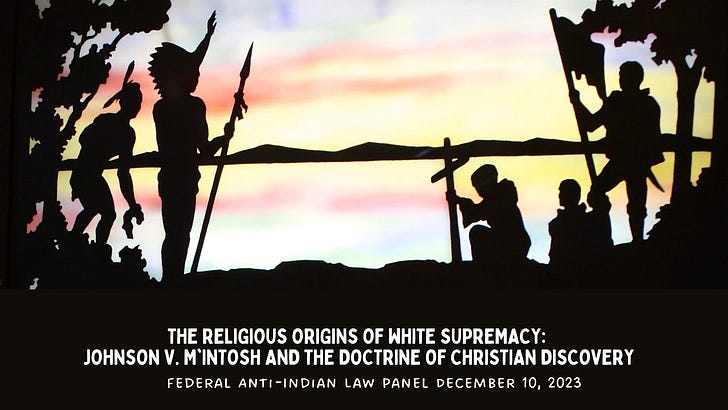Why Indian Treaties Have Always Been Violated
Courts Around the World Tacitly Rely on the Doctrine of Discovery Still Today
Updated February 19, 2024
I recently discovered
's Substack and the video of a conference on “Federal Anti-Indian Law” in which he is one of three panelists. If I’d succumbed to my impatience with the introduction, I would have missed the supremely important and little known insight presented by the panelists about why and how Indian treaties have been repeatedly violated: the U.S. Supreme Court does not recognize Indians as having any actual ownership of their lands!
All this goes back to the Doctrine of Discovery, which had its foundations in the Divine Right of Kings and the plenary (absolute) power of the Papacy. According to an 1823 Supreme Court decision, Johnson vs. M’intosh, the U.S. government claims to have inherited ownership of the continent conceded to Britain for having “discovered” the land void of Christians.
Discovery of America by Great Britain gave them the exclusive right to settle, possess, and govern the new land, and the absolute title to the soil, subject to certain rights of occupancy of the Native Indians.
By treaty between Great Britain and the United States, the powers of government, and the right to the soil, passed to the United States, subject only to the Indian right of occupancy, and the exclusive power to extinguish that right was vested in that government which might constitutionally exercise it. Conquest gives a title that the Courts of the conqueror cannot deny, respecting the original justice of the claim that has been successfully asserted.
—Johnson v. M’intosh, 1823, case brief
According to Sandra Day O’Connor College of Law professor Robert J. Miller:
Johnson has been cited scores of times by courts in New Zealand, Australia, Canada, and the British Privy Council. The elements that make up this international law are still plainly visible in the histories, policies, and modern-day laws of the settler colonial countries named above and in Chile, Brazil, and Africa.
Beginning in the mid 1900s, the Supreme Court decided it was better to leave the word “Christian” out when citing its reliance on the Doctrine of Christian Discovery.
It's absolutely amazing that these antiquated claims to power are still tacitly relied on in the decisions of the Supreme Court with regard to the Indians and their lands, and even most Indian attorneys fail to challenge these claims head on. Even though I was familiar with the Doctrine of Discovery, I had no idea that it remains the foundation of U.S. court decisions that brush aside any obligations towards honoring Indian lands and treaties. As discussed by the panelists, vague reference to Johnson v. M’intosh and other blatantly racist, colonialist Supreme Court decisions from the 19th and early 20th centuries that rely on the Doctrine of Christian Discovery are still given as tacit justification for rulings against treaty rights of Indians into the 21st century (i.e. Indians weren’t Christians, therefore, as far as European royalty and the Papacy were concerned, they were disregarded as “possessing” ANY of the lands they had lived in for centuries; and continue to be disregarded).
Peter d'Errico is a graduate of Yale Law School who fresh out of school found himself working in defense of the Navajo. There he discovered many things that led him to begin looking at U.S. Indian law, and “America” itself, "from the outside." The other two panelists are Steve Newcomb, Shawnee/Lenappe author of Pagans in the Promised Land, and Joe Heath of the Onondaga Nation. All three speak about the entire situation with a great deal of intelligence, each building on what the other two have presented. They’re among the few people who seem to really be getting to the heart of the issues.
If people, and especially Native Peoples, can see it for what it is and challenge the foundational assumptions that have been working against them, there is a chance that they will be more successful in today's climate where it is not as popular to be blatantly anti-Indian as it was during colonial expansion.
What is the Doctrine of Christian Discovery?
In 1493, after news of the discovery of the New World, sent by the Catholic Monarchs of Spain, reached Rome, Pope Alejandro VI (himself a Spaniard) issued a Bull which “concedes in perpetuity everything that has been or is to be discovered,” to the West of a line drawn on a primitive map, to Queen Isabel of Castile and King Ferdinand of Aragon, “with the recommendation of instructing the natives in the Catholic Faith and teaching them good customs.” What lay East of that line was to go to the Portuguese Crown under the same recommendation.
This and subsequent Papal Bulls established a right of conquest and subjugation to the “discoverers”, though less than 40 years later, in 1537, Pope Paul III would be influenced to attempt to limit what had quickly become, from the very beginning in fact, a brutal campaign of genocide and enslavement. That attempt was unsuccessful.
Exemplary of the ludicrousness of these “Christian” rights to conquer and vanquish the “pagan enemy” was the Spanish requerimiento which the conquering vanguard was required to read (in Spanish) whenever reaching a previously uncontacted settlement:
“In the name of the royalty of Spain, tamers of barbarian peoples, I inform you that the Holy Father, Lord of the Universe, has graciously bestowed on the King of Castille all the land of these Indies, so I require the settlers of these lands to abandon them as soon as possible, because they do not belong to them. And if you want to stay and live here, that you pay their Highnesses tribute in gold as a sign of obedience. In case of refusal or delay we will go to war against you; we will turn you into slaves, as well as your wives and children, and as such you shall be sold and removed by our king. Know also that the deaths and damages of this Just War will not be the fault of the Spaniards.”
Never mind that the inhabitants couldn’t hear them as the intruders stood off in the distance preparing the assault, and that they wouldn’t have understood a word of this high-sounding bigoted nonsense if they had.
Exactly how these ludicrous claims of Christian dominion over unknown lands were in various regions wrested from the Spaniards by France, Russia, Germany, Holland and even Anglican England is not entirely clear to me. But once the European kingdoms laid claim to indigenous lands, they continued to rely on the Papal Bulls and on Christian dogma as the justification and authority for their murderous campaigns of ethnic cleansing, land theft and genocide, even after the various land-speculating colonies forged their independence from European monarchs. And it didn’t matter whether the conquerors were Catholic or not. Nearly every Christian denomination committed crimes against the native peoples, justified by Christian “right” and superiority.
Many churches have recently issued statements of repudiation/apology for the Doctrine of Christian Discovery, though perhaps not entirely transparently:
Nearly 20 Christian denominations and the World Council of Churches have made official statements of repudiation of the Doctrine. This has occurred in response to the voices of Indigenous activists and scholars, which we acknowledge with appreciation. In the most egregious case of avoidance, no statement of repudiation has yet been made from the source of the Doctrine, the Vatican.
That was true in 2022, at the time that article was written. However, on March 2023, after decades of urging by indigenous rights groups, the Vatican finally issued a statement repudiating the doctrine that came to be formed based on it’s own 500+ year old declarations. (Note: Upon first publication of this article, I’d missed this important development.)
Recommended:
Challenging these still-relied-on medieval institutions of divine right, of absolute title and of the plenary or absolute power of conquerors over the native inhabitants of the land head on, knowing what it is and calling it out, seems key to any progress. Because in reality, antiquated ideologies like the Doctrine of Discovery do not receive broad social support in today's world—the court systems are relying on precedents from a bygone era. Yet it is opportunistic capitalism and land speculation, cloaked by court precedents that the majority have no understanding of, that are what is driving the claims, both then and now.
Finally, I would like to add that I think this has relevance on a far greater scale than just the U.S. and the American Indians. For example, it appears that the State of Israel has much the same attitude towards Palestinians. We could also talk about indigenous peoples everywhere where nation states claim to have the right to decide about their fates, usually siding with transnational capitalism.
“Now the ball is in the court of governments, the United States and in Canada — but particularly in the United States, where the doctrine is embedded in the law.”
—Phil Fontaine, former national chief of the Assembly of First Nations in Canada
Books
I’d like to take this opportunity to let my readership know that a book on the 500 year conquest of indigenous peoples I’ve been working on translating into English for the past four years is nearly finished, and we (Spanish author Pedro Ceinos and myself) are in the process of looking for a publisher or literary agent who will work with us.
The book is tentatively titled,
Abya-Yala
An Indian History
500 Years of Oppression, Genocide, Assimilation and Resistance
Stay tuned for updates on our progress, and if you have any suggestions or recommendations please leave a comment below.
I’d also like to make my readers aware of three books recommended by Peter d’Errico on the subject of this post:
The following three books are must-read to get the cart and horse arranged properly:
Steven Newcomb's book, Pagans in the Promised Land: Decoding the Doctrine of Christian Discovery, reveals and challenges the presumption that Native nations and peoples are legitimately subject to United States domination.
My [d’Eerrico’s] book, Federal Anti-Indian Law: The Legal Entrapment of Indigenous Peoples, builds on Steve’s challenge and provides a comprehensive critique of how the US legal system maintains a claim of a right of domination into the present day.
Arguments over Genocide: The War of Words in the Congress and the Supreme Court over Cherokee Removal, by another friend, Steven Schwartzberg, builds on these two books with a detailed empirical study of the intentions of the framers of the US Constitution as they debated the claim of a right of domination leading to “Indian removal” and the “Trail of Tears”.
Tobin Owl is an independent researcher/writer. Over the past three years he’s conducted in-depth investigation focusing on the history of modern medicine, medical science, geopolitical conspiracy and the environment. Articles written prior to his move to Substack are found on his website Cry For The Earth






“In the name of the royalty of Spain, tamers of barbarian peoples, I inform you that the Holy Father, Lord of the Universe, has graciously bestowed on the King of Castille all the land of these Indies, so I require the settlers of these lands to abandon them as soon as possible, because they do not belong to them. And if you want to stay and live here, that you pay their Highnesses tribute in gold as a sign of obedience. In case of refusal or delay we will go to war against you; we will turn you into slaves, as well as your wives and children, and as such you shall be sold and removed by our king. Know also that the deaths and damages of this Just War will not be the fault of the Spaniards.”
^I've never seen a "just war" - the most "just" of them was as far as I can tell a manipulated setup for the gain of someone at the expense of humanity as a whole.
Great article, Tobe!